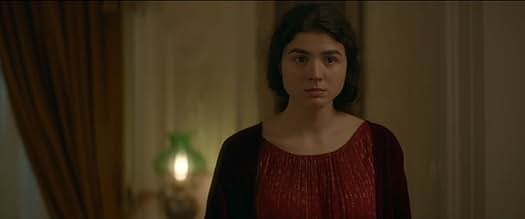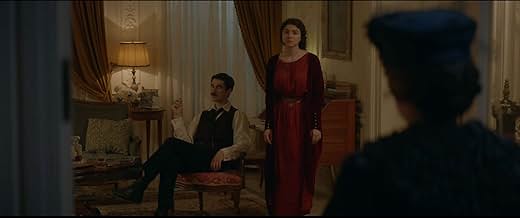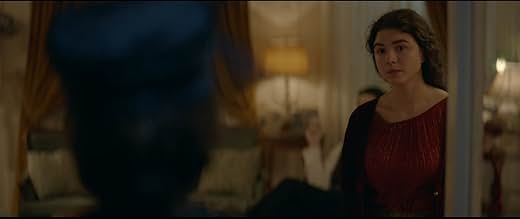Queen Marie of Romania
- 2019
- 1h 50min
NOTE IMDb
7,2/10
2,5 k
MA NOTE
Dévastée par la Première Guerre mondiale et plongée dans des troubles politiques, la Roumanie place ses espoirs dans sa reine lors d'une mission diplomatique à Paris lors des négociations de... Tout lireDévastée par la Première Guerre mondiale et plongée dans des troubles politiques, la Roumanie place ses espoirs dans sa reine lors d'une mission diplomatique à Paris lors des négociations de paix de 1919.Dévastée par la Première Guerre mondiale et plongée dans des troubles politiques, la Roumanie place ses espoirs dans sa reine lors d'une mission diplomatique à Paris lors des négociations de paix de 1919.
- Récompenses
- 2 victoires et 1 nomination au total
Avis à la une
No disrespect to the honorable intentions of its creators, but this film is far from being a satisfying experience. Whether you are an aficionado for historical films or just a regular cinephile, you can't help but feeling a little irked by the film's mediocrity. No matter how impressive some palaces or costumes may look, they hardly make up for pompous acting, cliched dialogue and tiresome scenes. On television it could have made a fairly acceptable soap opera. The big screen, however, is a totally different story.
What's more disappointing is that major historical figures of Romania, such as Bratianu, Averescu, King Ferdinand, Prince Carol (future King Carol II) and others are depicted as poor caricatures of themselves. The same goes for personalities like Lloyd George, Woodrow Wilson and Clemenceau. While it's common knowledge that cinema is definitely not a history class, we simply can't overlook the fact that the way in which the film adapts historical facts and characters to its narrative is an injustice to a whole era, both historically and artistically.
There is no depth, no other dimension to any of the protagonists. Apart from the leading lady, presented in a rather messianic light, the film overflows us with dozens of supporting characters and the minute we start taking a slight interest in them, it flatly abandons them.
Roxana Lupu seems to be more excited about getting to play the role of the queen than about the role itself. She tries her best to look convincing, but, being so heavy-handedly directed, she does very little in making us truly empathize with her character. A case in hand in this respect is the pompous manner in which her character (the queen) repeats throughout the film how much she loves Romania and how proud she feels to lobby for her country's interests. In my humble opinion, if you are making films and you want to convey certain feelings and messages to your audience, this ought to be reflected in your cinematic approach as a whole, not in just a few lines of dialogue (which in this film is infuriatingly repetitive). Cinema is, after all, a very powerful medium and, if one posesses the skill, one may be able to convey a thousand messages in just one frame without anyone having to speak a single word. However, making your actors repeat the same things for two hours and in a such overblown manner, is dull, uninspired and a little insulting to the viewer's intelligence (not to mention that it adds to the characters' artificiality).
All in all, the film leaves a great deal to be desired and that is really a pity, because an important figure such as Queen Maria and a major geopolitical event like the creation of Greater Romania deserve much better than cheap romanticism. I am amazed that, having such a great material in their hands, the creators of the film could offer nothing more than a series of heavily used clichés. They may be the safe option and guarantee tickets, but, at the end of the day, all they leave behind is an audience addicted to low-quality filmmaking and, on a second level, a number of misconceptions regarding Romania's modern past.
What's more disappointing is that major historical figures of Romania, such as Bratianu, Averescu, King Ferdinand, Prince Carol (future King Carol II) and others are depicted as poor caricatures of themselves. The same goes for personalities like Lloyd George, Woodrow Wilson and Clemenceau. While it's common knowledge that cinema is definitely not a history class, we simply can't overlook the fact that the way in which the film adapts historical facts and characters to its narrative is an injustice to a whole era, both historically and artistically.
There is no depth, no other dimension to any of the protagonists. Apart from the leading lady, presented in a rather messianic light, the film overflows us with dozens of supporting characters and the minute we start taking a slight interest in them, it flatly abandons them.
Roxana Lupu seems to be more excited about getting to play the role of the queen than about the role itself. She tries her best to look convincing, but, being so heavy-handedly directed, she does very little in making us truly empathize with her character. A case in hand in this respect is the pompous manner in which her character (the queen) repeats throughout the film how much she loves Romania and how proud she feels to lobby for her country's interests. In my humble opinion, if you are making films and you want to convey certain feelings and messages to your audience, this ought to be reflected in your cinematic approach as a whole, not in just a few lines of dialogue (which in this film is infuriatingly repetitive). Cinema is, after all, a very powerful medium and, if one posesses the skill, one may be able to convey a thousand messages in just one frame without anyone having to speak a single word. However, making your actors repeat the same things for two hours and in a such overblown manner, is dull, uninspired and a little insulting to the viewer's intelligence (not to mention that it adds to the characters' artificiality).
All in all, the film leaves a great deal to be desired and that is really a pity, because an important figure such as Queen Maria and a major geopolitical event like the creation of Greater Romania deserve much better than cheap romanticism. I am amazed that, having such a great material in their hands, the creators of the film could offer nothing more than a series of heavily used clichés. They may be the safe option and guarantee tickets, but, at the end of the day, all they leave behind is an audience addicted to low-quality filmmaking and, on a second level, a number of misconceptions regarding Romania's modern past.
A great movie about a subject I knew nothing about, beautifully made with good cast, great costumes and sets. I would have liked to have delved deeper into the Greater Romania thing. I know that present days Romania has chunks of what Hungary calls its own and Moldova the same. It didn't show how the monarchy's of Central Europe after WWI where doomed by their own weakness. In the movie its mentioned that the Royal Family of Romania are German Princess given the job because had nothing to do after the unification of Germany in 1871.
But back to the movie, really the only ones who seem to be able to tell these stories in modern cinema are the European co-productions. They have a feel and of course the wonderful locations are no harm. the lovely scene near the end between Ferdinand and Marie at the castle was just gorgeous and ended the movies in a lovely way.
This movie is something that Romania didn't knew it needed but it did. Great costumes and choice of actors. As a romanian maybe I would have enjoyed a little bit more detail in their everyday life, the action goes quite fast . I believe it managed to capture well the spirit of our most beloved queen. Going to see this in cinema really gave me , and the rest of the viewers, a feeling of patriotism and pride. Queen Maria of Romania is our most beloved monarchy figure and this movie is an amazing addition to our culture.
Greetings again from the darkness. There are likely those who know less about the history of Romania than I, but that list is pretty short. Co-writers and co-directors Alexis Sweet Cahill of Italy and Brigitte Drodtloff of Germany, along with three other listed co-writers: Gabi Antal, Ioana Manea, and Maria-Denise Teodoru, bring us the more than 100 year-old story of Queen Marie, and it's "based on True Events" (including the Queen's own writings).
Roxana Lupu, originally from Romania, plays Queen Marie, a Monarch who likely doesn't receive the historical credit she deserves. Her husband, King Ferdinand I is played by Daniel Plier, who really isn't given much to do here ... hence the film's title. A spectacular opening shot takes us over a frozen river and drops us into Bucharest in 1919. World War I has recently ended, and no one seems to care much about the state of Romania, except Romanians. Having sided with the Triple Entente (Russia, France, and Great Britain), hopes are now fading for a united Romania.
Against the preferences of Romanian Parliament, her husband, and just about everyone else, Marie headed to the Peace Talks being held in Paris ... yes, the talks that led to the Treaty of Versailles. Though most tried to encourage her to let the politicians handle the politics, Marie reminded them that she was the granddaughter of Queen Victoria, and thus is not silenced easily. She forced and maneuvered her way in to meetings with powerful world leaders of the time to negotiate for international recognition (and assistance) of a united Romania.
Above all else, this is the story of strong woman fighting for her country. She goes toe-to-toe with Prime Minister Ion Bratianu (Adrian Titieni), French Prime Minister Clemenceau (Ronald Chenery), and U. S. President Woodrow Wilson (Patrick Drury) in her efforts to be heard. She even battles her own son Prince Carol II (Anghel Damian), who would later become King. Ms. Lupu is excellent in the role, and she has previously played Queen Elizabeth (twice), as well as a Princess and a Grand Duchess, so clearly has the screen presence to pull off such royal and regal roles. The film only teases her attraction to Prince Stirbey (Emil Mandanac), and the personal history between her and her cousin, King George V (Nicholas Boulton).
It's a period drama with the requisite costumes, hair styles, and set design necessary to whisk us away to a century ago, and mostly we learn there was more to this popular Queen than her commitment to feeding citizens during a difficult time. The closing credits give us archival footage as well as the political developments that occurred. The time period covered is limited, but one that was crucial for a country and her Queen.
Available On Demand and on Digital May 7, 2021.
Roxana Lupu, originally from Romania, plays Queen Marie, a Monarch who likely doesn't receive the historical credit she deserves. Her husband, King Ferdinand I is played by Daniel Plier, who really isn't given much to do here ... hence the film's title. A spectacular opening shot takes us over a frozen river and drops us into Bucharest in 1919. World War I has recently ended, and no one seems to care much about the state of Romania, except Romanians. Having sided with the Triple Entente (Russia, France, and Great Britain), hopes are now fading for a united Romania.
Against the preferences of Romanian Parliament, her husband, and just about everyone else, Marie headed to the Peace Talks being held in Paris ... yes, the talks that led to the Treaty of Versailles. Though most tried to encourage her to let the politicians handle the politics, Marie reminded them that she was the granddaughter of Queen Victoria, and thus is not silenced easily. She forced and maneuvered her way in to meetings with powerful world leaders of the time to negotiate for international recognition (and assistance) of a united Romania.
Above all else, this is the story of strong woman fighting for her country. She goes toe-to-toe with Prime Minister Ion Bratianu (Adrian Titieni), French Prime Minister Clemenceau (Ronald Chenery), and U. S. President Woodrow Wilson (Patrick Drury) in her efforts to be heard. She even battles her own son Prince Carol II (Anghel Damian), who would later become King. Ms. Lupu is excellent in the role, and she has previously played Queen Elizabeth (twice), as well as a Princess and a Grand Duchess, so clearly has the screen presence to pull off such royal and regal roles. The film only teases her attraction to Prince Stirbey (Emil Mandanac), and the personal history between her and her cousin, King George V (Nicholas Boulton).
It's a period drama with the requisite costumes, hair styles, and set design necessary to whisk us away to a century ago, and mostly we learn there was more to this popular Queen than her commitment to feeding citizens during a difficult time. The closing credits give us archival footage as well as the political developments that occurred. The time period covered is limited, but one that was crucial for a country and her Queen.
Available On Demand and on Digital May 7, 2021.
Looking for love it - that was, in my case, the desire of me. And for love it - many reasons, from the admirable performance of Ruxandra Lupu, giving the fair and the nuanced , full merited portrait of the Queen to the imppecable costumes, use of English and Romanian and atmosphere. The only , basic , in fact problem, remains the dialogue. It reminds the wood language, the melodramatic speeches from the Romanian cinematography before 1990 and few films by Sergiu Nicolaescu after. Maybe it is not a real sin, maybe is trait of specific but , behind the story, very useful to be known , something remains not exactly finished. But, no doubts, a beautiful film and necessary for some reasons.
Le saviez-vous
- AnecdotesQueen Marie, who was born into the British Royal Family as the granddaughter of Queen Victoria, became one of the most popular royal figures in European history.
Meilleurs choix
Connectez-vous pour évaluer et suivre la liste de favoris afin de recevoir des recommandations personnalisées
- How long is Queen Marie of Romania?Alimenté par Alexa
Détails
Box-office
- Montant brut mondial
- 677 896 $US
- Durée1 heure 50 minutes
- Couleur
Contribuer à cette page
Suggérer une modification ou ajouter du contenu manquant

Lacune principale
What is the Brazilian Portuguese language plot outline for Queen Marie of Romania (2019)?
Répondre






























